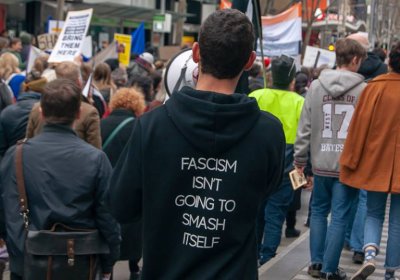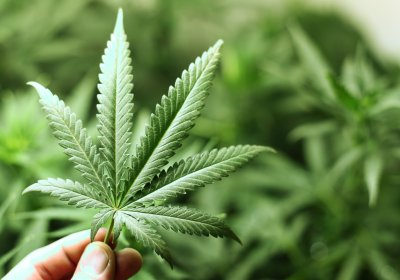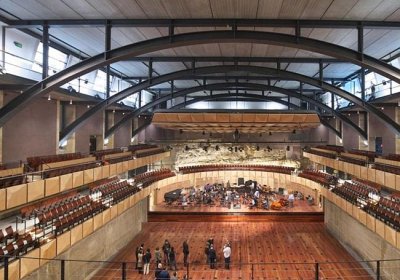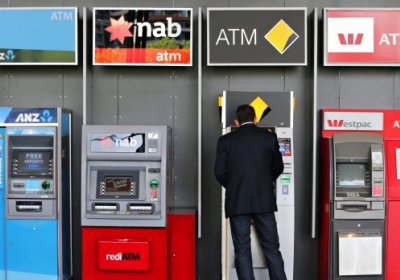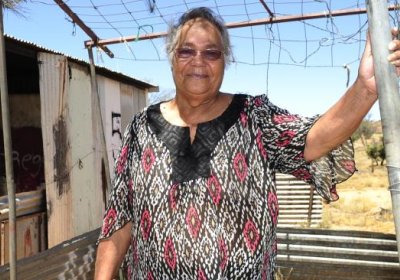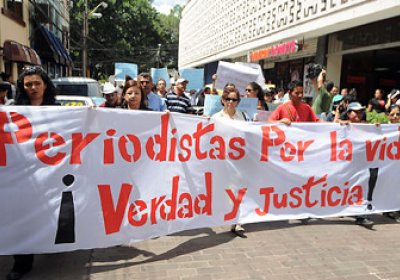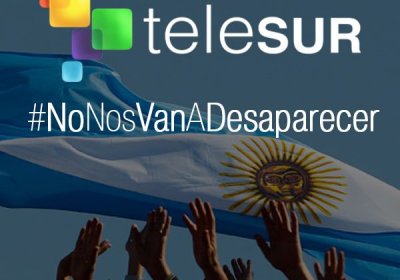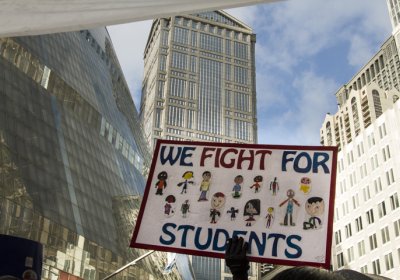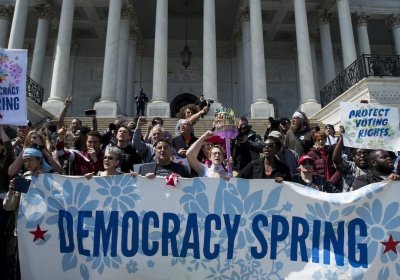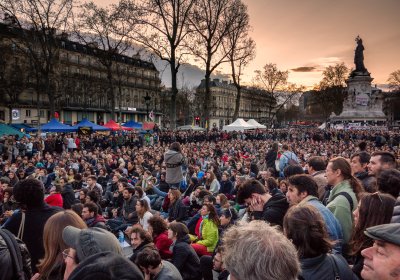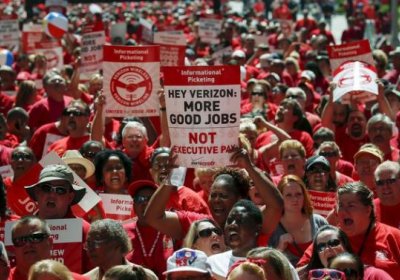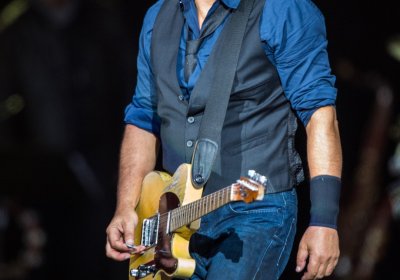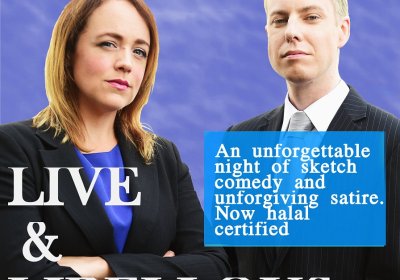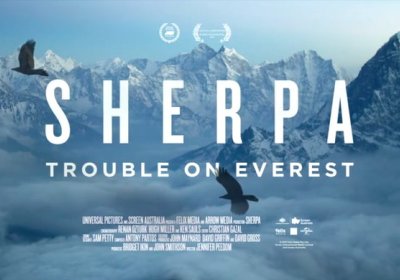Sky News has been widely condemned for hosting a neo-Nazi on its TV station.
Issue 1091
News
 About 200 unionists, refugee activists and students rallying in Melbourne on April 8 outside a Liberal Party fundraiser to celebrate 20 years since the election of the Howard government, were attacked by police on horses and the indiscriminate use of pepper spray.
About 200 unionists, refugee activists and students rallying in Melbourne on April 8 outside a Liberal Party fundraiser to celebrate 20 years since the election of the Howard government, were attacked by police on horses and the indiscriminate use of pepper spray.
 About 130 people attended the Socialist Alliance election launch in Sydney on April 15. The night launched the campaign to elect Peter Boyle in the seat of Sydney and the Senate team of Ken Canning, Susan Price, Sharlene Leroy-Dyer and Howard Byrnes. It was a very positive night with Aboriginal activists, unionists and activists signing on to the People's Movement.
About 130 people attended the Socialist Alliance election launch in Sydney on April 15. The night launched the campaign to elect Peter Boyle in the seat of Sydney and the Senate team of Ken Canning, Susan Price, Sharlene Leroy-Dyer and Howard Byrnes. It was a very positive night with Aboriginal activists, unionists and activists signing on to the People's Movement.
150 people rallied at the Stirling Gardens and then marched through the streets of Perth in protest against ongoing Black deaths in custody in Australia.
Analysis
 I moved to Sydney at the start of this year. For months I have spent every Sunday I'm not working rushing around the Inner West being interviewed as a flatmate, only to suffer rejection after silent rejection.
I moved to Sydney at the start of this year. For months I have spent every Sunday I'm not working rushing around the Inner West being interviewed as a flatmate, only to suffer rejection after silent rejection.
"Let's take the big banks head on over their crimes and their attempts to cover up their massive financial rip-offs, and nationalise them under workers' and community control," Peter Boyle, Socialist Alliance candidate for the seat of Sydney in the upcoming federal election, said on April 14. Boyle was responding to reports the banks were considering a huge advertising blitz against plans by the Greens and the Labor Party to launch a Royal Commission into the banking and finance sectors.
Fifty years ago building worker activists took back control of their union, the NSW Builders Labourers Federation (BLF), from a leadership clique that ignored the members. Under the new leadership of , the re-energised BLF created high standards for workplace safety, decent pay, union democracy, accountable leadership, community engagement and, most famously, Green Bans.
World
 Photo: TeleSUR.
International delegations from more than 20 different countries gathered with Honduran social movements on April 14 to demand justice for Berta Caceres, the environmentalist and indigenous activist assassinated in the Central American nation on March 3.
Photo: TeleSUR.
International delegations from more than 20 different countries gathered with Honduran social movements on April 14 to demand justice for Berta Caceres, the environmentalist and indigenous activist assassinated in the Central American nation on March 3.
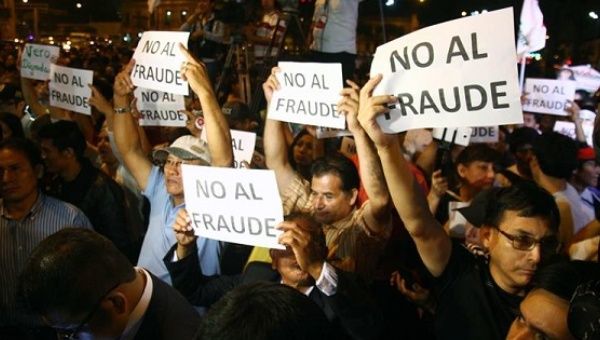 Supporters of leftist candidate Veronika Mendoza protest electoral fraud. Lima, April 10. Photo: EFE.
Peruvian left-wing presidential candidate Veronika Mendoza came third in the first round of Peru's presidential elections on April 10, behind former World Bank economist Pedro Pablo Kuczynski and Keiko Fujimoro, the daughter of a jailed ex-president.
Supporters of leftist candidate Veronika Mendoza protest electoral fraud. Lima, April 10. Photo: EFE.
Peruvian left-wing presidential candidate Veronika Mendoza came third in the first round of Peru's presidential elections on April 10, behind former World Bank economist Pedro Pablo Kuczynski and Keiko Fujimoro, the daughter of a jailed ex-president.
Venezuelans took to the streets on April 14 to protest a new housing law proposed by the new right wing-controlled assembly that seeks to privatise public housing. TeleSUR correspondent in Caracas Iain Bruce reported: “Government supporters are protesting against a law passed by parliament to allow public housing to be sold.”
 Photo: Albaciudad.org.
The Venezuelan Supreme Court unanimously ruled on April 11 that a controversial “amnesty law” passed by the country's right-wing opposition-controlled parliament is unconstitutional, Venezuela Analysis said the next day.
Photo: Albaciudad.org.
The Venezuelan Supreme Court unanimously ruled on April 11 that a controversial “amnesty law” passed by the country's right-wing opposition-controlled parliament is unconstitutional, Venezuela Analysis said the next day.
Five hundred Toronto-area supporters crowded into a west-end school auditorium March 29 to support the Leap Manifesto, for a “justice-based” energy transition to renewable economy.
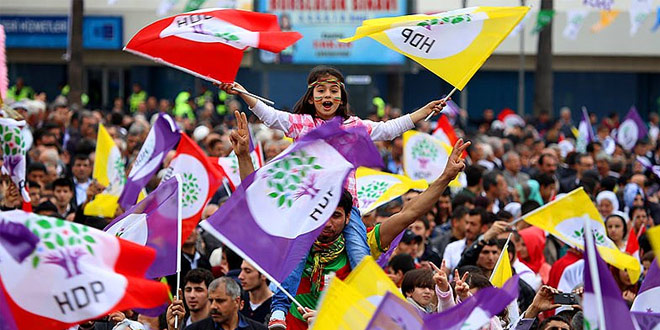 The Peoples’ Democratic Party (HDP), a Kurdish-led party that has united a swath of Turkey’s broad left, has proposed a new law in parliament to establish peace and legally guarantee all peace talks regarding the Kurdish question.
The move comes as the Turkish government, having ended peace talks with the Kurdistan Workers’ Party (PKK) last year, carries out a brutal war on largely Kurdish areas in Turkey.
The Peoples’ Democratic Party (HDP), a Kurdish-led party that has united a swath of Turkey’s broad left, has proposed a new law in parliament to establish peace and legally guarantee all peace talks regarding the Kurdish question.
The move comes as the Turkish government, having ended peace talks with the Kurdistan Workers’ Party (PKK) last year, carries out a brutal war on largely Kurdish areas in Turkey.
Anyone following French politics in recent years should not be surprised by the recent explosion of public protest and resistance across the country. For years, France has simmered with a combination of a deeply unpopular government, a limping economy and a struggling, fed up populace.
Nearly 40,000 Verizon Communications workers walked off the job on April 13. Joined by US Democratic presidential candidate Bernie Sanders, they protested a lack of progress in contract talks more than eight months after their agreements with the company expired.
There is a so-called “Refugee Hunter” called Dinko Valev who has become infamous within Bulgaria and the EU for assaulting and illegally detaining asylum seekers who he finds have entered Bulgaria from the Turkish border.
Culture
It is impossible to read Farmageddon: The True Cost of Cheap Meat without coming to the conclusion that the world's food and agriculture system is screwed.
The Sherpa are a Nepalese ethnic minority who have a reverent regard for the world’s highest mountain, Chomolungma — known in English as Everest.
